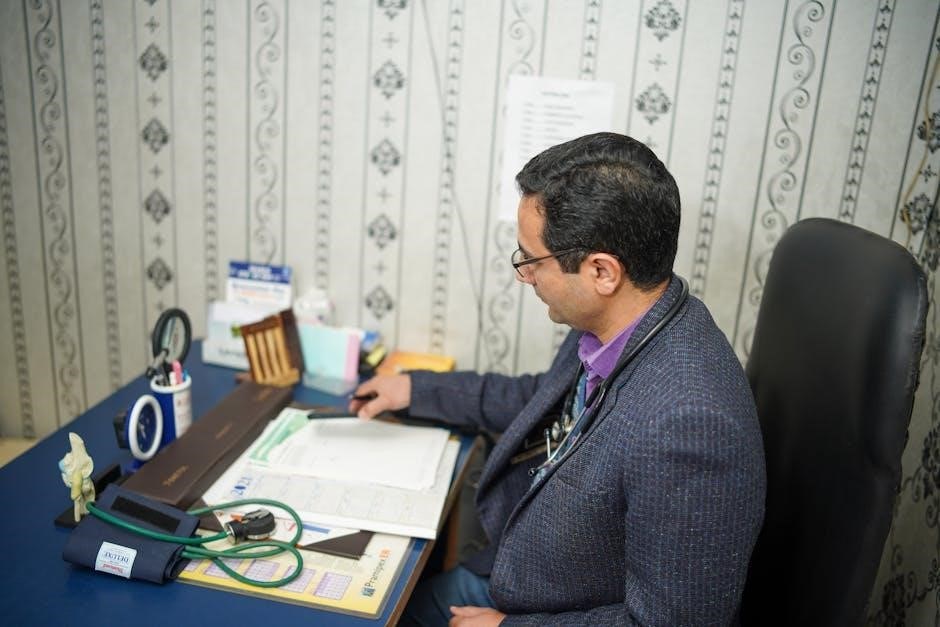The Diocese of Allentown, established in 1961, serves a diverse population, including a significant Hispanic community. It operates across several districts, focusing on spiritual growth and social services.
1.1 Overview of the Diocese
The Diocese of Allentown, established in 1961, encompasses five counties in eastern Pennsylvania. It serves a diverse population, with a significant Hispanic presence. The diocese is committed to fostering spiritual growth, education, and community outreach through its parishes, schools, and social services, addressing the needs of its vibrant and faith-driven community.
1.2 Historical Background
Established in 1961, the Diocese of Allentown serves eastern Pennsylvania, addressing the spiritual needs of a diverse population. Historically, it has faced challenges, including investigations into sexual abuse allegations, prompting reforms and accountability measures. The diocese has also emphasized catechetical formation and outreach, reflecting its commitment to faith and community service throughout its history.

Understanding the Writing Folder Record Sheet PDF
The Writing Folder Record Sheet PDF is a document used for tracking and managing records within the Diocese of Allentown, ensuring accuracy and compliance with legal standards.
2.1 Purpose and Functionality
The Writing Folder Record Sheet PDF serves as a centralized tool for organizing and tracking records within the Diocese of Allentown. Its purpose is to ensure accurate documentation, streamline administrative processes, and maintain compliance with legal and canonical requirements. The functionality includes categorizing records, tracking updates, and providing easy access to essential information, aiding in transparency and accountability across diocesan operations.
2.2 Structure and Contents
The Writing Folder Record Sheet PDF is structured into clear sections, ensuring organized documentation; It includes sections for event summaries, correspondence, meeting minutes, and compliance checks. The contents are categorized for easy reference, with detailed fields for dates, parties involved, and actions taken. This systematic approach ensures all relevant information is captured and accessible, supporting efficient record management and accountability within the diocese.
Record-Keeping Practices in the Diocese
The Diocese prioritizes accurate and accessible record-keeping to ensure transparency and accountability. Regular audits and adherence to canonical and legal standards maintain integrity and trust effectively.
3.1 Importance of Accurate Documentation
Accurate documentation is vital for maintaining trust, accountability, and legal compliance. It ensures clarity in decision-making, supports audits, and preserves historical records. Proper records facilitate transparency, protect individual rights, and uphold the diocese’s integrity. They also aid in addressing allegations, ensuring fairness, and providing a clear audit trail. This practice is non-negotiable for responsible governance and spiritual leadership within the diocese.
3.2 Compliance with Canonical Requirements
Compliance with canonical requirements ensures the Diocese of Allentown operates in harmony with Catholic Church laws. This includes proper record-keeping, transparent processes, and adherence to ethical standards. Canonical compliance supports investigations, maintains accountability, and upholds the integrity of diocesan operations. It also ensures that all actions align with Vatican guidelines, fostering trust and maintaining the moral authority of the diocese in addressing allegations and managing its affairs responsibly.

The Role of the Diocese in Addressing Sexual Abuse Allegations
The Diocese of Allentown plays a crucial role in addressing sexual abuse allegations by implementing preventive measures, supporting victims, and ensuring accountability and transparency in investigations.
4.1 Historical Context and Recent Developments
The Diocese of Allentown has faced scrutiny over sexual abuse allegations, highlighted by the 2018 Pennsylvania Grand Jury Report. Historically, the diocese had internal policies addressing abuse, but recent developments include enhanced transparency measures, mandatory reporting protocols, and clergy accountability. Efforts to prevent future abuse include training programs and support for victims, reflecting a commitment to justice and healing within the diocese.
4.2 Measures for Prevention and Accountability
The Diocese of Allentown has implemented safe environment programs to prevent abuse, including background checks for clergy and staff. Mandatory reporting policies ensure allegations are addressed promptly. Accountability measures include regular audits and training for employees. The diocese also provides support services for victims and collaborates with law enforcement to ensure transparency and justice.
Canonical Requirements for Diocesan Documentation
The Diocese of Allentown adheres to canonical laws, ensuring accurate and confidential record-keeping. Essential documents are maintained securely to comply with ecclesiastical regulations and safeguard sensitive information.
5.1 Essential Documents and Records
The Diocese of Allentown maintains essential records, including sacramental registers, clergy personnel files, and legal agreements. These documents ensure accountability and compliance with canonical laws. The Writing Folder Record Sheet PDF serves as a critical tool for organizing and tracking important information, aiding in accurate record-keeping and verification processes within the diocese.
5.2 Procedures for Maintaining Confidentiality
The Diocese of Allentown implements strict confidentiality measures, including restricted access to sensitive records and encryption of digital files. Secure physical and digital storage systems are used to protect personal and canonical information. Staff are trained to handle sensitive data discreetly, ensuring compliance with privacy laws and ethical standards. The Writing Folder Record Sheet PDF aids in organizing such information securely.

Catechetical Formation and Diocesan Policies
The Diocese of Allentown emphasizes catechetical formation through structured programs and resources, supported by materials like the Writing Folder Record Sheet PDF, ensuring alignment with diocesan guidelines.
6.1 Programs for Religious Education
The Diocese of Allentown offers comprehensive religious education programs, supported by resources like the Writing Folder Record Sheet PDF. These initiatives focus on faith formation, sacramental preparation, and spiritual development for all ages, ensuring a strong foundation in Catholic teachings and values. Such programs are designed to foster a deeper connection with the Church and its community.
6.2 Guidelines for Parish and Diocesan Staff
The Diocese of Allentown provides clear guidelines for parish and diocesan staff, emphasizing professionalism, confidentiality, and adherence to canonical and civil laws. These guidelines, often documented in resources like the Writing Folder Record Sheet PDF, ensure ethical standards are maintained. Staff are expected to uphold the Church’s teachings while serving the community with integrity and compassion, fostering a safe and supportive environment for all members.

The Diocese’s Response to Community Needs
The Diocese actively addresses community needs through outreach initiatives, collaborating with local organizations to support vulnerable populations and address diverse social and spiritual requirements effectively.
7.1 Outreach Programs and Initiatives
The Diocese of Allentown implements outreach programs targeting underserved communities, including food drives, health services, and educational support. These initiatives aim to uplift the community through compassion, aligning with Catholic social teachings. By fostering partnerships with local organizations, the Diocese strengthens its commitment to serving those in need, ensuring comprehensive and impactful outreach efforts across its districts.
7.2 Collaboration with Local Organizations
The Diocese of Allentown actively collaborates with local organizations to address community needs. By partnering with non-profits, schools, and health providers, the Diocese amplifies its outreach efforts. These joint initiatives focus on education, healthcare, and social services, ensuring resources reach vulnerable populations. Such collaborations strengthen community bonds and align with the Diocese’s mission to serve with compassion and integrity.

Legal and Ethical Considerations in Diocesan Operations
The Diocese of Allentown must adhere to both civil and ecclesiastical laws, ensuring ethical standards are upheld in all operations to maintain trust and integrity in its mission.
8.1 Compliance with Civil and Ecclesiastical Laws
The Diocese of Allentown ensures adherence to both civil and ecclesiastical laws, maintaining legal and moral standards. This includes following canonical requirements and local regulations to uphold integrity and accountability in its operations, ensuring all activities align with the teachings of the Church and the legal frameworks governing its actions and documentation practices.
8.2 Ethical Standards for Clergy and Lay Employees
The Diocese of Allentown enforces strict ethical standards for clergy and lay employees, ensuring moral integrity and accountability. These standards are designed to foster trust and uphold the Church’s mission, with clear guidelines for conduct, confidentiality, and transparency, ensuring all actions reflect the values of the Catholic Church and promote a safe and respectful environment for all members of the community.

The Role of Technology in Diocesan Record Management
Technology enhances record management efficiency, ensuring accuracy and security. Digital tools like databases and encryption protect sensitive information, streamlining operations and maintaining compliance with legal standards.
9.1 Digital Tools for Record-Keeping
The Diocese of Allentown utilizes advanced digital tools like databases and encryption software to securely manage records. These tools enhance efficiency, ensuring accurate and organized documentation. VideoStudio and similar software aid in creating and storing multimedia records, while Ministry Scheduler Pro streamlines volunteer coordination. Digital solutions enable seamless access and sharing of information, supporting compliance with legal and canonical requirements.
9.2 Security Measures for Sensitive Information
The Diocese of Allentown employs robust security measures to protect sensitive records. Encryption, secure databases, and access controls ensure confidentiality. Regular audits and staff training reinforce data protection protocols. Compliance with legal and canonical standards is prioritized to safeguard personal and ecclesiastical information from unauthorized access or breaches, maintaining trust and integrity in diocesan operations.
The Diocese of Allentown continues to evolve, addressing past challenges while embracing innovation. Future efforts will focus on enhancing ministries, transparency, and community outreach to foster a united, compassionate church.
10.1 Summary of Key Points
The Diocese of Allentown is a vibrant faith community serving diverse populations, with a strong emphasis on catechetical formation, outreach, and canonical compliance. Historical challenges, including abuse allegations, have prompted significant reforms and accountability measures. Record-keeping practices, supported by digital tools, ensure transparency and adherence to both civil and ecclesiastical laws. The diocese remains committed to fostering spiritual growth and addressing community needs through collaborative initiatives and ethical standards.
10.2 Recommendations for Improved Practices
Enhance transparency by implementing advanced digital tools for record management and ensure staff training on ethical standards. Strengthen community engagement and collaborate with external experts for best practices. Regularly review and update policies to align with legal requirements and address emerging challenges proactively. Prioritize confidentiality and security in documentation to build trust and maintain integrity in diocesan operations.